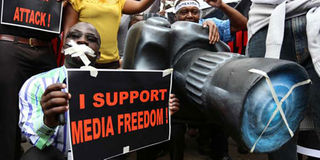Why journalists may not report well on elections

Members of the media during a demonstration along Moi Avenue in Nairobi on December 3, 2013. FILE PHOTO | NATION MEDIA GROUP
Government harassment and intimidation of independent reporters and lack of police investigations into abuses against journalists threatens to undermine coverage of this year’s elections.
Human Rights Watch and Article 19 Eastern Africa, in a report, say that Journalists and bloggers reporting on corruption, disputed land acquisition, counterterrorism operations, election violence among other sensitive issues, have faced intimidation, violence and even lost their jobs.
In the report ‘Not Worth the risk’, the two human rights organisations documented government attempts to obstruct journalists and bloggers with legal, administrative and informal measures, including threats, intimidation, harassment, online and phone surveillance, and in some cases, physical assaults.
Article 19 Regional Director Henry Maina said, during the release of the report, that no policy to address the situation can be successful if measures to prevent aggression against and, to protect at-risk journalists are not accompanied with thorough and timely prosecutions of all crimes committed against them.
“Despite receiving formal complaints from journalists, police have rarely investigated the attacks or threats.
“Since President Uhuru Kenyatta took office in 2013, there is no evidence that any security officer or public official has been held accountable for threatening, intimidating, or physically attacking a member of the media in Kenya,” Mr Maina said.
The report documents at least two journalists’ deaths, which occurred under unclear circumstances and which have been linked to their jobs.
It also documented 16 incidents of direct death threats against journalists and bloggers across the country and cases in which police arbitrarily arrested, detained, and later released without charge at least 14 journalists and bloggers.
In one of the deaths — that of Denis Otieno — unidentified assailants forcibly gained entry into his house in Kitale and demanded photos on his camera, then shot him dead.
Mr Otieno had photographed police officers shooting to death a motorcycle rider at a Kitale bus station a few days earlier. No one has been arrested in connection to the murder.
The report said with the general election set for August 8, state security agencies have heightened threats and appear to be using ambiguous legal provisions to carry out increased surveillance, without warrants, on journalists reporting on sensitive issues.
“For Kenya’s August elections to be credible and fair, the media needs to be able to report on pressing issues of national interest without fear of reprisals,” Africa researcher at Human Rights Watch, Otsieno Namwaya said.
The International Covenant on Civil and Political Rights, to which Kenya is a party, provides for the right to hold opinions without interference and the right to free expression.





